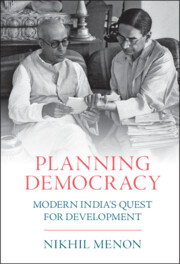2 - Calcutta Conquers Delhi
from Part I - Data
Published online by Cambridge University Press: 24 March 2022
Summary
Chapter 2 lays out how the planning-induced expansion in the state’s capacities led to the formalization of planning’s relationship with statistics. Changes at both the Planning Commission and the Indian Statistical Institute bear witness to this. It placed a statistician and a statistical institute in a position where they could, in turn, shape Plans. The chapter traces a boomerang’s arc: planning’s influence on statistics led to statistics’ influence on planning. It explains how the Indian Statistical Institute completed the transition from a small scholarly body in the outskirts of Calcutta and on the fringes of mainstream academia in the 1930s, to a nodal agency in Indian economic planning by the mid-1950s. And it describes the way in which Mahalanobis used the close proximity of national statistics and economic planning at this moment to carve a position for himself at the Planning Commission. This culminated in him and the Institute drafting India’s pivotal Second Five Year Plan (1956–61), the economic blueprint for decades thereafter. The very possibility that a statistician could transform into an economic planner reveals the wide latitude granted to experts and expertise in a technocratic state.
Keywords
- Type
- Chapter
- Information
- Planning DemocracyModern India's Quest for Development, pp. 52 - 92Publisher: Cambridge University PressPrint publication year: 2022



